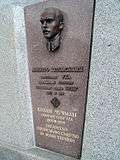Dmytro Vitovsky
Dmytro Vitovsky (Ukrainian: Дмитро Вітовський) (8 November 1887, Medukha, Stanislau powiat, Galicia and Lodomeria, Austro-Hungary – 8 July 1919, Racibórz, Silesia, Germany) was a Ukrainian politician[1] and military leader.
Dmytro Vitovsky Дмитро Вітовський | |
|---|---|
 | |
| State Secretary of Armed Forces of West Ukraine | |
| In office November 9, 1918 – February 13, 1919 | |
| Prime Minister | Kost Levytsky Sydir Holubovych |
| Preceded by | position created |
| Succeeded by | Viktor Kurmanovych |
| Personal details | |
| Born | November 8, 1887 Medukha, Stanislau powiat, Galicia and Lodomeria, Austro-Hungary |
| Died | July 8, 1919 (aged 31) Racibórz, Silesia, Germany |
| Nationality | Ukrainian |
| Alma mater | Lviv University |
| Military service | |
| Allegiance | Austro-Hungary (1914-1918) West Ukrainian National Republic |
| Branch/service | Ukrainian Galician Army |
| Years of service | 1914 - 1919 |
| Rank | Captain Colonel (Jan. 1, 1919) |
| Commands | Ukrainian Sich Riflemen Ukrainian Galician Army |
| Battles/wars | World War I Polish-Ukrainian War |
Vitovsky was born into a family of gentry.[2] in the village of Medukha in Galicia (today in Halych Raion). He graduated from the Stanislau gymnasium and later was a student activist at the law school of Lviv University. Later Vitovsky joined the Ukrainian Radical Party and was an active organizer of a number of Ukrainian educational and scouting Sich groups near Stanislau, which later became part of the regular Galician Army.
Vitovsky started his active military career in 1914 participating in mountain battles in the Carpathians, and was an ideologist of Ukrainian military political thought. In 1916-1917 he was a Ukrainian military commissar in Volhynia, and organized Ukrainian schools there. Vitovsky also was co-founder of the Striletsky Found, and published the official newspaper of the Ukrainian Sich Riflemen, Shliakhy ('The Pathways'). He became a company commander of the Legion of Sich Riflemen and carried out special assignments (guerrilla warfare). Towards the end of World War I Vitovsky was appointed the chairman of Ukrainian Military Committee that organized the takeover of Lviv. He became the first commander of the Ukrainian Galician Army (November 1–5, 1918).
A week later after being commissioned as the first commander of the Galician Army Vitovsky was appointed as the State Secretary of Armed Forces in Levytsky's government. On January 1, 1919 he was promoted from major to colonel. As a deputy of the Ukrainian National Rada (February - April, 1919) Vitovsky was chosen to attend the Paris Peace Conference as a member of the Western Ukrainian delegation, in May 1919. Vitovsky perished in an aircraft crash during the flight from Paris to Kamyanets-Podilsky in August 4, 1919[3] and was buried in Berlin.
On November 1, 2002, the remains of Dmytro Vitovsky were reburied at the Lviv Lychakiv Cemetery on the initiative of Yuri Ferentsevich.[4][5]

References
- Encyclopedia of Ukraine (in English)
- The Hero of the November Snatch Dmytro Vitovsky. Lvivska Hazeta. By Ihor Chornovil.
- No. 36 THE UKRAINIAN WEEKLY SUNDAY, SEPTEMBER 8,1991 / page 7 / Thanks and a correction / My father died in an airplane crash on August 4, 1919, and not on July 8, 1919.
- Відійшов на Вічну Ватру пл.сен. Юрій Ференцевич, ВБ. (… з його ініціативи прах міністра військових справ ЗУНР Д.Вітовського … привезено з Німеччини в Україну і перепоховано на Личаківському меморіальному цвинтарі.) (in Ukrainian)
- Ференцевич Юрій (in Ukrainian)
Sources
- Lviv Study. Handbook. / Compiler group manager N.Vynnytska.- Lviv: AHIL, 2003.- 52 p. ISBN 966-7617-59-9